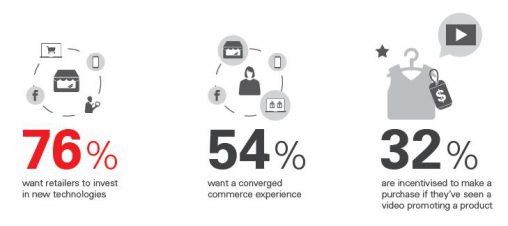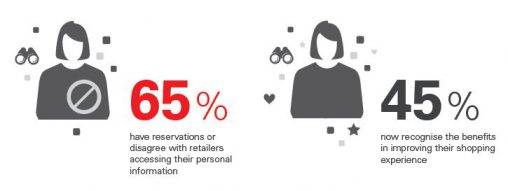![]() Shoppers want retailers to invest in technology which will enhance their customer experience and connect digital and store channels according to results from Oracle’s 2015 consumer research report Retail Without Limits – A Modern Commercial Society.
Shoppers want retailers to invest in technology which will enhance their customer experience and connect digital and store channels according to results from Oracle’s 2015 consumer research report Retail Without Limits – A Modern Commercial Society.
Seventy-six (76) per cent of respondents want retailers to invest in new technology to improve the shopping experience, and 54 per cent stated that converged commerce was key to enhancing their shopping experiences.

Bill Kearney, Oracle’s senior director – Retail, said if retailers wait for consumer demand to force them to change, they risk losing their customers to other retailers offering a ‘destination’ experience.
“I think honestly that responding to the needs of your consumers is a critical element to drive all sorts of activities in retail but I think the people that are going to win in the end are the ones that aren’t going to wait for their consumers to force them into a particular direction,” he said.
Kearney said retailers should invest in the kinds of technology that gives them a clear understanding of their product (where it is, how much they have and what it costs to move it) and a single view of your customer (how they like to shop, how often they shop with you etc).
Bringing these two things together will allow retailers to put the customer at the centre of the shopping experience. However the research also highlighted that retailers need to be wary to maintain customers’ privacy, especially when accumulating their data. The Oracle research found 65 per cent of respondents have reservations with retailers gaining access to information on their shopping habits, yet In contrast, 45 per cent understand the benefits of doing so, and want to be able to take advantage of more targeted promotions and rewards. Only 15 per cent of respondents are happy to allow retailers to track their movements in-store or online, and both responses rated lower than the global average of 56 per cent and 23 per cent respectively.

Kearney said the first way retailers can use customer data to improve customer service without unnerving them is using data which doesn’t identify the customer to give them a better experience. For example, if they are searching online for a TV by brand not by price then the sale items should automatically filter to the bottom of the list. Paying close attention to what the customer is doing and why they are doing it can lead to better search and navigation features to find what you are looking for as quickly as possible, Kearney said.
The second way retailers can offer customers an improved experience is through information provided to the retailer from customers who have created an account or joined a loyalty program. These repeat customers have opted in to provide retailers with some of their preferences which can be used to refine the offers presented to these customers.
Overseas retailers arriving in Australia are lifting consumer expectations for a “destination experience rather than an omnichannel experience,” Kearney said.
“The reality is that there is a series of opportunities for Australian retailers… I really don’t like the message that Australian retail is necessarily behind, but I think that the reality is that there are areas of improvement that have to be executed because if you don’t in this day and age you’re really going to suffer as you go forward.”
As for timing, a lower Australian dollar which makes overseas online retailers less attractive and the government’s recent budget measure which makes any item used for running a business up to the value of $20,000, 100 per cent tax deductible create favourable conditions for retailers thinking updating their business systems.
Kearney offered these four suggestions for the types of technologies retailers should consider investing in:
- Technology that helps facilitate a model of Click & Collect.
- Technology that provides real time view of your inventory. Seventy-Four (74) per cent of respondents want visibility of stock and 61 per cent believe that access to information across digital and store channels benefits their experiences most.
- Investments in mobile ‘searchability, ie making an online store easy to navigate from a mobile device.
- Tablet applications to empower your staff. Anything that gives staff access to expert knowledge when selling is useful, for example adding product information to POS device which already contains stock inventory allows store associates to easily access information if a customer asks a tricky question.


